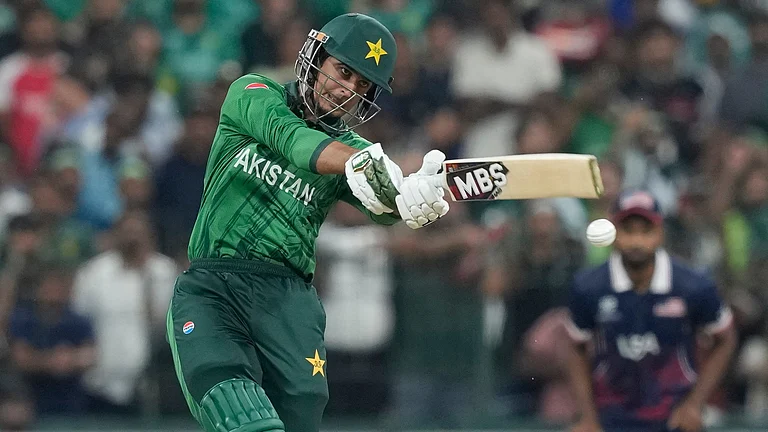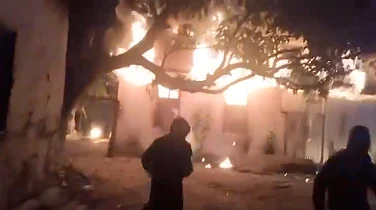SOME were extremists who took a potshot at the British regime, some tread the non-violent path of Mahatma Gandhi, while some were ardent believers of Subhas Chandra Bose's fiery pronouncements. Freedom fighters all, a motley group of wizened men are spending the twilight of their lives at a home in south Calcutta, and in the 50th year of Independence, have very little to be optimistic about. But the rigours of the past have stood them in good stead. They haven't given up hope and lead a spirited existence in the company of each other and Subhas Chandra Bose, Rabindranath Tagore, Aurobindo et al whose pictures adorn the walls.
Surviving on a pittance of Rs 1,500—if the Centre is sponsoring them—or Rs 350, the state government pension, Sushil Sen Gupta (79), Kartick Chandra Das (90), Bireswar Home Choudhury (75), Jyotish Chandra Aich (87), Biren Dhar (76), Sailesh Biswas (90),Chittaranjan Sarkar (77) and Phani Bhusan Some (73) are trying to make the most of an uneventful life within the confines of the South Garia Home for Old and Infirm Political Sufferers, set up in 1968 by the state government. The only one of its kind in the country, the home for freedom fighters also houses the destitute and the women's wing, called Shanti Neer, was added in the '80s.
Old and infirm they all are but sometimes there is an identity crisis: whether a particular inmate is a freedom fighter or a political sufferer. Take the case of 85-year-old Sudhir Das. Too ill to prove his credentials, the state government has asked the Centre to update his status to the freedom fighter category so that he can also avail of the pension. Sachin Roy Choudhury (73), who went to jail after Independence for an active role in the trade union, and Dulal Bose (73) are political sufferers.
Two meals, a four o'clock snack and tea are on the house; other expenses are borne by the inmates. Freedom fighters and political sufferers are housed on the first and second floors; destitute men and women on the fourth and ground floor. Initially, there were about 30 to 40 political sufferers but many have died. An empty bed and a walking stick are the only reminders of Dwijendralal Bhattacharya, a freedom fighter who died last March.
As for the others, they toil on, taking comfort from the surrounding green. The four-storey home is part of a sprawling six-bigha area complete with a fishpond and a garden. It is the task of Arati Roy Choudhur y, the superintendent, to look after the wellbeing of these special inmates in a home which doesn't have a residential doctor, trained nurses or even attendants. In the absence of professional help, Roy Choudhury often depends on the ageing the destitute of Shanti Neer to help her out with the chores.
Most of the freedom fighters have been abandoned by their families; some have chosen to stay at the only official home for freedom fighters in India to avail of benefits—their wives visit them occasionally. An occasion the inmates look forward to. Says Sen Gupta of one such 'sister': "We do miss her so when she is not around."
In the absence of any family, these fighters of a bygone era have fallen back on each other: they talk, debate, eat, sleep and reminisce together. Dulal Bose gets excited at the very mention of Netaji and cannot bear to hear any criticism of his 'neta'. Sarkar says he was initiated into politics by veteran Forward Bloc leader Anil Roy. "I still correspond with Anilda but we do not discuss politics. Before Independence, I was arrested several times and kept in different jails. I was shunted back and forth between Dhaka and Nadia." Sen Gupta, who was in the Forward Bloc, says there is no reason why the United Front Government should fail to deliver. Politics is obviously their favourite subject despite the overwhelming feeling that they have been given the short shrift by a government and a people, apathetic to their contribution to the freedom struggle. "The present set of leaders are not idealistic and hence the decay in society," points out Sarkar, who thinks Indira Gandhi was the last effective leader, standing taller than her father Jawaharlal Nehru. Sen Gupta takes responsibility for the rot that has set in: "Perhaps we have not been able to guide this generation."
But life is not completely without the small joys that lift the spirit. Most of the inmates spend January 26 and August 15 hoisting a national flag in a local club or school because, explains Roy Choudhury, they are revered by the people living around. Sen Gupta, who reads a lot and rues the lack of political debates at the home, says the spread of education, especially in backward areas, would have helped the country move forward. The disillusionment is total and the common refrain is: "Our country's progress has not been impressive, nor has it been uniform. This is not the kind of freedom we fought for."
There are moments when they come alive, when a memory flashes across their minds. Biren Dhar is all fired up when he recalls that day when he shot at a White magistrate in erstwhile East Bengal. "I was only 15 and ended up injuring his orderly. As I was very young, the British let me off." So, was he scared? "Scared? At 15, you do not know fear."
Others love to hold forth on West Bengal and agree that "Bengal is a shade better than other states where social and political corruption are concerned." And that Jyoti Basu is an asset to the state. Recalls Sen Gupta: "During one election, I came to know Jyoti Basu who even appreciated my style of campaigning."
Sen Gupta has now taken refuge in the pages of the Gita. He recites the text loudly every morning on a tiny verandah off his room. "I think I enrich myself by reading religious texts. And now that I have more time, I can delve deeper." Sarkar also loves to read but his passion is modern literature. "I try to keep in touch with local issues through these books."
As the shadows lengthen, they retreat to their rooms, and settle down for the night, some with the day's newspaper to keep in touch with the world. A world which has lost touch with them.






















